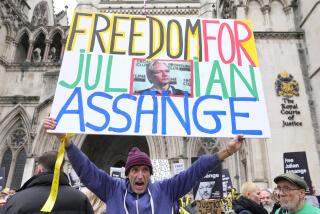Snowden could avoid extradition from Hong Kong
- Share via
BEIJING -- With U.S. prosecutors having filed criminal charges against Edward Snowden, attention turned Saturday to Hong Kong, whose authorities now must decide how to proceed with the case of the self-proclaimed NSA leaker who has been holed up for weeks in the Chinese territory.
At a brief news conference Saturday, Hong Kong Police Commissioner Andy Tsang said only that the matter would be handled according to law, and refused to answer a question about whether Snowden was in a police “safe house.” After initially spending time in a Hong Kong hotel, Snowden reportedly moved to a private residence in the territory of 10 million, which has its own legal system apart from the mainland’s.
Hong Kong and the U.S. have a treaty that allows for extraditions; however, there are several scenarios under which Snowden might avoid being returned to the United States. The treaty carries an exception for political offenses; some experts say espionage cases could certainly be regarded as political. Snowden could also file an asylum claim.
PHOTOS: Famous document-leakers in history
According to Simon N.M. Young, director of the Center for Comparative and Public Law at the University of Hong Kong, once Hong Kong receives a formal request for Snowden’s surrender, the territory’s chief executive, C.Y. Leung, must issue what’s known as an authority to proceed.
Hypothetically, Leung could refuse to issue such an authority -- if, for instance, he determines that this would violate Hong Kong law. Hong Kong authorities can’t honor the extradition request unless they have some statute in their own law that corresponds with a violation of U.S. law.
Snowden has been charged with theft of government property and two violations of the Espionage Act: unauthorized communication of national defense information and providing U.S. classified intelligence to an unauthorized person.
Once an authority to proceed is issued by Leung, a magistrate can issue an arrest warrant; in exceptional cases, a provisional arrest warrant may be issued without an authority to proceed.
Were Snowden to be detained, Young said, bail is difficult to obtain. He would then go before a magistrate for “committal proceedings” -- during which the judge essentially assesses whether there is sufficient evidence to warrant Snowden’s trial.
If the magistrate finds there is insufficient cause to surrender Snowden, or determines that doing so would violate Hong Kong law, Snowden could be freed. If the magistrate finds in favor of sending Snowden back to the United States, Snowden could appeal.
Concurrently, Snowden could also file an asylum claim, arguing that he faces political persecution, punishment that would constitute torture, or punishment that is cruel, inhuman or degrading.
“If he goes through the entire process and fights every issue, it certainly could be prolonged,” Young said. “The extent to which he’s willing and able to do that, it’s unclear.”
ALSO:
Russian human rights activist beaten by police
Palestinians sure this year’s ‘Arab Idol’ is one of their own
India flooding kills nearly 600 and leaves thousands stranded
More to Read
Sign up for Essential California
The most important California stories and recommendations in your inbox every morning.
You may occasionally receive promotional content from the Los Angeles Times.











